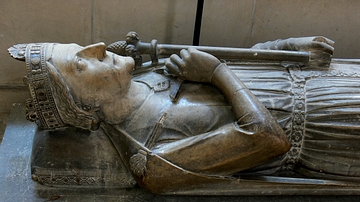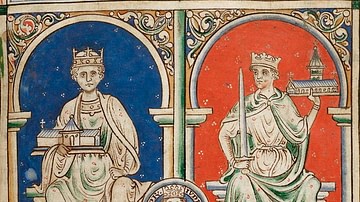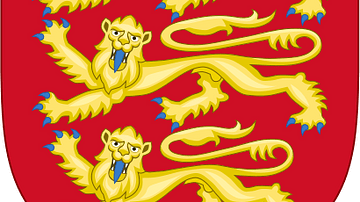Search
Search Results

Definition
Edward IV of England
Edward IV of England ruled as king from 1461 to 1470 CE and again from 1471 to 1483 CE. The Hundred Years' War (1337-1453 CE) had been lost by Edward's predecessor, Henry VI of England (1422-1461 CE & 1470-1471 CE), leaving Calais as the...

Image
Tomb of Richard I of England, Fontevraud Abbey
An effigy of Richard I of England (r. 1189 - 1199 CE), popularly known as Richard the Lionheart, from his tomb in Fontevraud Abbey in France.

Image
Effigy of Richard I of England
The effigy of Richard I of England (r. 1189-1199), also known as Richard the Lionheart (Cœur de Lion). Fontevraud Abbey, France.

Image
Tomb of Richard I's Heart, Rouen
A photo of a tomb in the Rouen Cathedral, containing the embalmed heart of Richard I of England (also known as Richard the Lionheart; r. 1189 - 1199 CE). In Rouen, France.

Image
Henry II & Richard I
A 13th century CE illustration of King Henry II of England (r. 1154-1189 CE) and Richard I of England the Lionheart (r. 1189-199 CE). (British Library)

Image
Arms of Richard I
The arms of Richard I, king of England from 1189 to 1999 CE, and Engish kings thereafter.

Definition
Henry VI of England
Henry VI of England ruled as king from 1422 to 1461 and again from 1470 to 1471. Succeeding his father Henry V of England (r. 1413-1422), Henry VI was crowned the king of France in 1431 but he could not prevent a French revival led by Charles...

Definition
Henry II of England
Henry II of England ruled from 1154 to 1189 CE. He gained the throne by negotiation with his predecessor King Stephen of England (r. 1135-1154 CE) following the civil war that had raged between that monarch and Henry's mother Empress Matilda...

Definition
John Paul Jones
John Paul Jones (1747-1792) was a Scottish-born sailor who served in the Continental Navy during the American Revolutionary War (1775-1783). His raid on the English port town of Whitehaven in 1778 and his victory over the HMS Serapis the...

Definition
King John of England - England's Most Unpopular King?
King John of England (aka John Lackland) ruled from 1199 to 1216 CE and he has gone down in history as one of the very worst of English kings, both for his character and his failures. He lost the Angevin-Plantagenet lands in France and so...